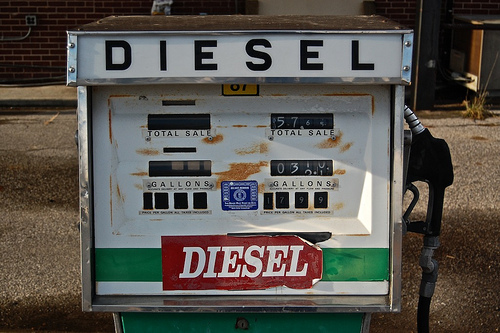Am I taking crazy pills?
I need some local transportation wonk—I’m looking at you, regular readers of this blog—to set me straight. Because as near as I can tell, a key piece of state transportation law doesn’t say what everyone thinks it says.
Let me explain. In Washington, “motor vehicle fuel” taxes are restricted by the state constitution to “highway purposes.” So everyone agrees that revenue from the state’s gasoline tax must be spent on roadways. I get that.
Here’s what I don’t understand: why everyone also agrees that the state’s tax on highway diesel must also be spent on roadways. As near as I can tell from reading Washington’s laws, diesel does not meet the legal definition of a “motor vehicle fuel.” And that would mean diesel tax revenues need not be spent on roads.
Before I proceed, I should mention that I’ve already consulted the experts on this matter. In fact, I reached out to four people I consider to be extremely knowledgeable about state transportation policy, and I made sure to consult folks across the political spectrum. They all agreed: taxes of “on-road” diesel are restricted to highway purposes.
But that’s not what the law seems to say.
Let’s dig in.
To start with, here’s what the 18th Amendment of the State Constitution has to say:
[A]ll excise taxes collected by the State of Washington on the sale, distribution or use of motor vehicle fuel and all other state revenue intended to be used for highway purposes, shall be paid into the state treasury and placed in a special fund to be used exclusively for highway purposes.
But what is “motor vehicle fuel”? To find out, we need to peek at RCW 82.36, pertaining to the motor vehicle fuel tax. It says:
“Motor vehicle fuel” means gasoline and any other inflammable gas or liquid, by whatsoever name the gasoline, gas, or liquid may be known or sold, the chief use of which is as fuel for the propulsion of motor vehicles or motorboats.
Compare this with RCW 82.38, the special fuel tax act:
“Special fuel” means and includes all combustible gases and liquids suitable for the generation of power for propulsion of motor vehicles, except that it does not include motor vehicle fuel as defined in chapter 82.36 RCW, nor does it include dyed special fuel…
So, in a nutshell: motor vehicle fuel refers to “inflammable” fuels while special fuel refers to “combustible” fuels. Got that?
Now, “inflammable” and “combustible” are actually technical terms. OSHA and nearly every other source I found online says that the dividing line is a flash point of 100 degrees F. The flash point of gasoline is under 100F, making it “flammable” (which, just to confuse matters, is synonymous with “inflammable”), while the flash point of diesel is over 100F, making it “combustible.”
According to Wikipedia at least, there’s an alternative standard of drawing the flammable-combustible line at 140.9 degrees F. But it doesn’t matter. The flash point of diesel is 144F, which makes it a “combustible” substance rather than a “flammable” one under this alternative definition too. (The flash point of gasoline, by contrast, is at -45F, making it “flammable” under either threshold.)
But wait, you may be thinking. Maybe RCW 82.36 just uses the word “inflammable” in the old non-technical sense of “you can burn it.” It’s unlikely that the drafters of the legislation were that sloppy, but remember that the law also defines “special fuel” as a mutually exclusive category of fuel, and that special fuels can include fuels used for “the propulsion of motor vehicles.” The only apparent legal distinction between “motor vehicle fuel” and “special fuel” is not whether it’s used on the road but whether the fuel is classified as inflammable or combustible. So we’re more or less forced to understand what the distinction between those words really means.
What’s the upshot? As near as I can tell, since diesel fuel is not “inflammable” it is not therefore a “motor vehicle fuel” as defined by Washington State law. That means tax revenue from diesel—even diesel burned on the road—is not subject to the 18th Amendment’s restriction to highway purposes. And that in turn means that state lawmakers have a lot more flexibility to spend money on non-highway purposes like transit or pedestrian infrastructure.
Surely I can’t be the first one to notice this, right? What am I missing?
Hat tip to Yoram Bauman.


Comments are closed.